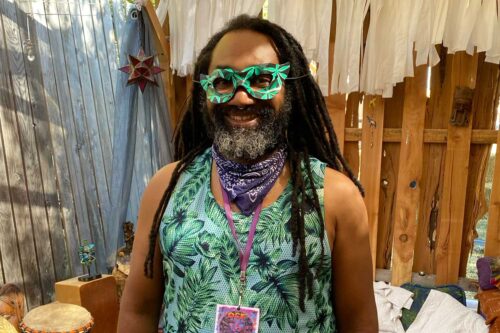
I’ve just returned from the Oregon Country Fair, for what I believe was my fifth time attending. After the 50th year, I had decided that I wouldn’t go again. While I won’t delve into the specific reasons behind that decision, I can say that OCF, like the rest of America, grapples with issues of race, class and privilege. Unfortunately, OCF seems to adopt a colorblind approach, turning a blind eye to the experiences of individuals like myself who fall outside the norm.
However, this year was different. I had the privilege of being part of the BIPOC Oasis, organized by the fiercely protective and inspiring Stormie True, who this year became the coordinator of the Oasis. Last year was the first time the BIPOC Sanctuary was at the Fair; however, it was housed in the Rainbow Connection. Now the Oasis has its own space in Xavanadu. Stormie, who worked on shift last year in the sanctuary uses “joy as resistance” to create change at OCF, where she has been attending since 2001.
For me, OCF has always been a transactional weekend. OCF seemed to be little more than an outside mall of local art. I spent my time going from a retail booth, to a stage for live music, back to a retail booth in repetition. Or, I would spend a majority of my time at my camp to avoid the crowds.
But working at the BIPOC Oasis this year was truly transformative. After a decade in Oregon, and five years at OCF, I finally found communities where I felt a sense of belonging. The Oasis is a BIPOC refuge from OCF, where BIPOC people can relax and reflect on the experience of OCF. For many people, including myself, OCF can be a triggering and overwhelming experience with no escape. The Oasis creates an escape from the overwhelming sounds, smells and sights.
I understand the frustration of those who may feel excluded from the Oasis. Being told that you can’t access a space is a different experience for those used to having complete access, and I empathize with their concerns. Some may be surprised that other Fair-goers came to “lecture” us about our space, but for me, it’s simply part of the OCF experience. I belong to the group that recognizes this reality.
The truth is, not every space can be for everyone. Oregon’s history includes the exclusion of Black people from settling in the state until 1926, which is why the state is still 86 percent white, according to the 2022 U.S. Census.
Oregon Country Fair itself is an incredibly exclusive community. Inside the Fairgrounds, there are spaces exclusively for women, saunas with a $12 entrance fee, designated areas for kids, private camps and many other spaces limited to a select few. The BIPOC Oasis is the newest addition, and I hope it serves as a catalyst for the creation of more inclusive spaces, starting with a safe space for transgender individuals.
I never considered myself part of the OCF Fair family, nor did I imagine bringing my children, I do now. I never thought I’d be an old man strolling the grounds, I do now. As someone from the Washington, D.C. metro area, the culture and ways of Eugene still feel foreign to me even after 10 years. However, knowing that this space and community exist makes my time in Eugene a little more tolerable. Finding your tribe is challenging, and when you do, you fight to hold onto it.